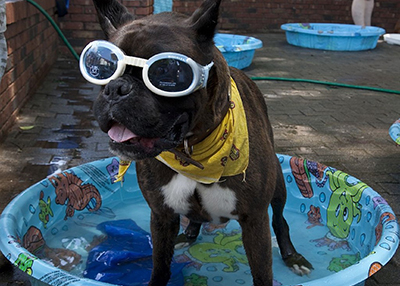Beat the Heat!
Beat the heat with your pet this summer! As summer is fast approaching, we are hearing a lot about what we need to do to stay safe and comfortable, mostly indoors. But what about our 4 legged friends? A lot of the same rules apply:
- Car Dangers! First and foremost, never leave a pet in a parked car. This is incredibly dangerous, with temperatures often skyrocketing within minutes of turning off the car. Even with the windows cracked, your car quickly becomes a furnace and can lead to heat stroke in your pet.
- Dawn and Dusk! It’s important that Fido get daily walks, especially if you have a high energy dog. But keep in mind you need to schedule that exercise at dawn or dusk when temperatures are a bit cooler.
- Ground Temps! We don’t often think of this, but if you have a small dog keep in mind they are literally inches away from the scorching hot pavement! And those poor little paw pads are easily burned. If possible, get in the habit of letting your dog walk in the grass beside the sidewalk to keep him off the pavement.
- Hydrate! Can never stress this enough! Just like humans, dogs need to stay hydrated. Make sure your pet always has access to fresh water. Get in the habit of taking a portable water bowl and bottle of water with you on walks, at the park, etc.
- Consider the Breed and Type! Certain breeds have a harder time dealing with heat than others. Snub nosed breeds (brachycephalic) like pugs, bulldogs, boxers, and Persian cats are examples that are more susceptible to heat stroke, along with senior aged, obese, or chronically ill pets.
- Skip Shaving! Your first thought might be to shave your pet down to the skin - let's face it - you wouldn't want to be covered in all that hair, right? Wrong! Your pet's coat can act as an insulator from the sun and protect them from the heat as well as from sunburns.
- Product Labels! For pink skinned dogs, you may need to use sunscreen - think tips of ears, nose, and exposed skin. In addition, you may opt for a mosquito repellent this summer. In both cases, make sure you are applying a pet safe product. Many human grade sunscreens and insect repellents can be toxic to our pets.
- Know the symptoms of overheating in pets, which include excessive panting or difficulty breathing, increased heart and respiratory rate, drooling, mild weakness, stupor or even collapse. Symptoms can also include seizures, bloody diarrhea and vomit along with an elevated body temperature. If you suspect your pet is overheated, get them to a vet immediately.


